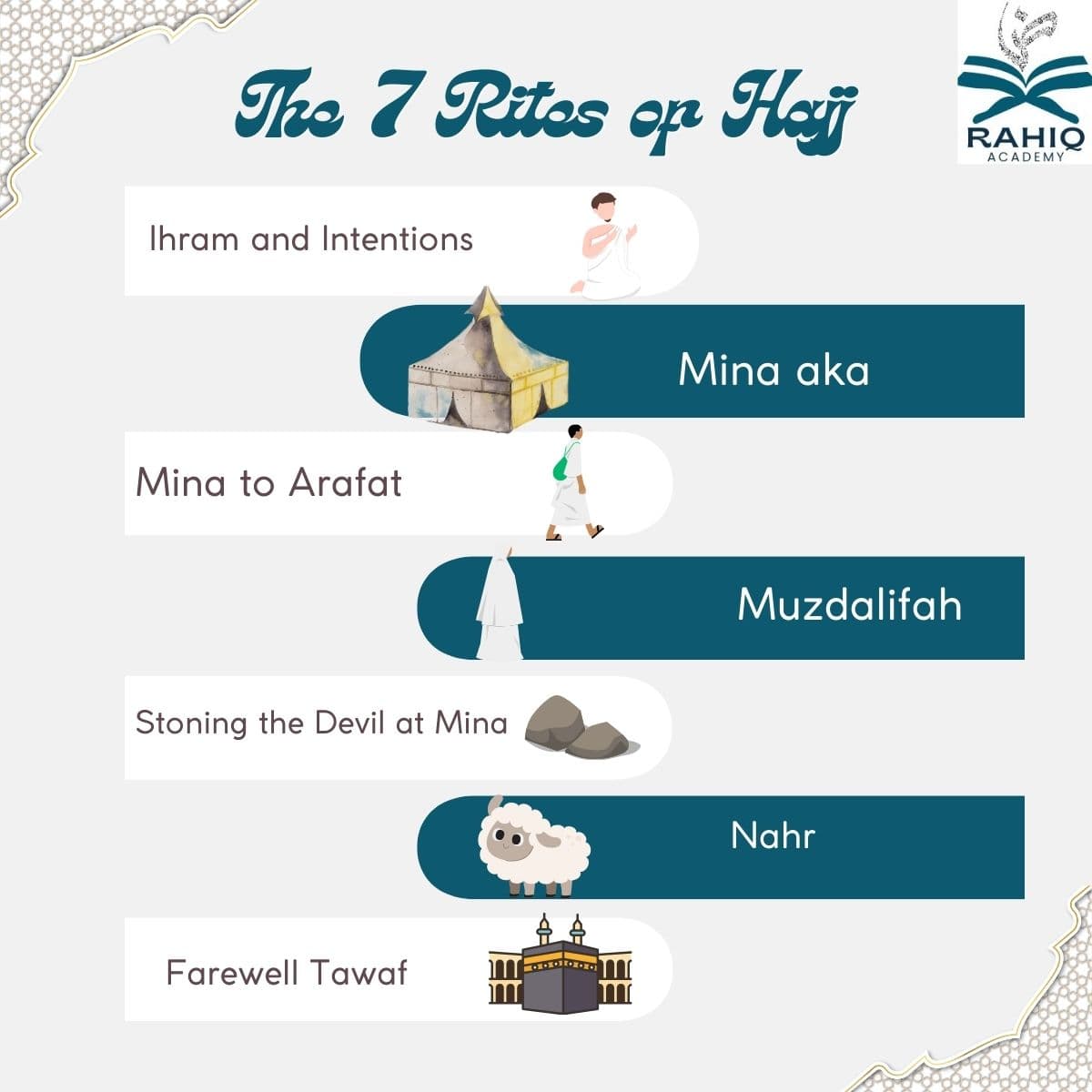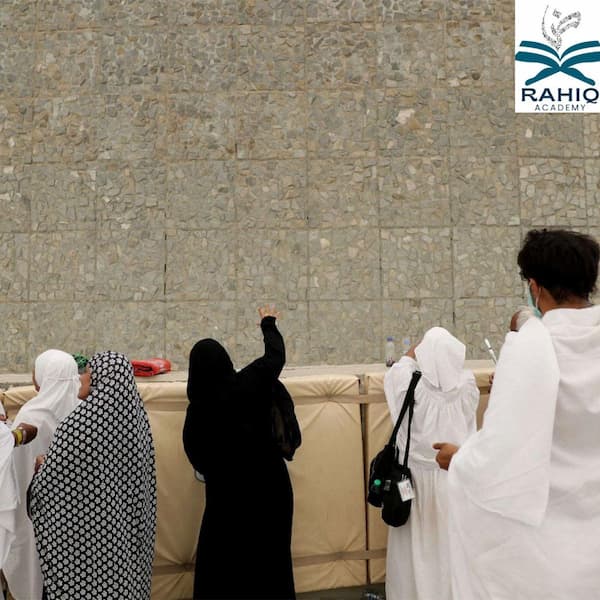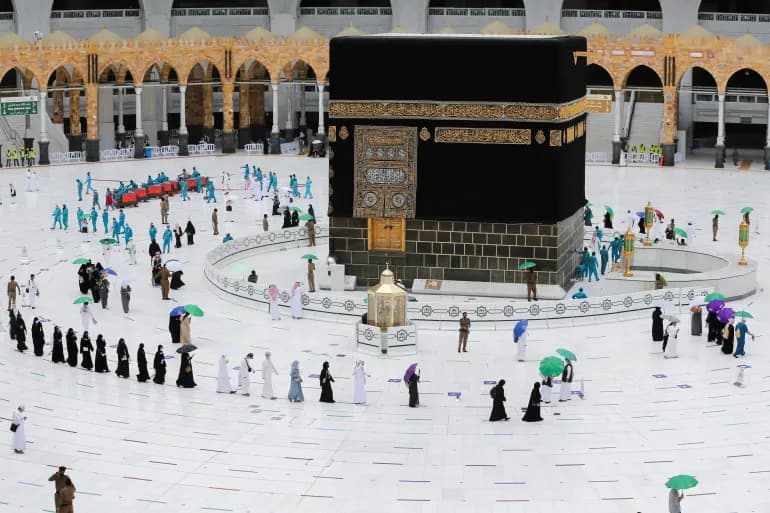Hajj is one of the five pillars of Islam and an essential act of worship for Muslims. It is obligatory for every Muslim who has the physical and financial means to perform it at least once in their lifetime. Allah says in the Quran:
وَلِلَّهِ عَلَى النَّاسِ حِجُّ الْبَيْتِ مَنِ اسْتَطَاعَ إِلَيْهِ سَبِيلًا ۚ وَمَن كَفَرَ فَإِنَّ اللَّهَ غَنِيٌّ عَنِ الْعَالَمِينَ
“And [due] to Allah from the people is a pilgrimage to the House—for whoever is able to find thereto a way. But whoever disbelieves – then indeed, Allah is free from need of the worlds.”
Explor Manasik al-Hajj and learn more about The 7 rites of Hajj with our step by step guide
What is Ihram in Islam?
Ihram is the sacred state a pilgrim must enter before performing the rites of Hajj and Umrah.
It involves wearing special garments and abstaining from certain actions. For men, this includes wearing two white seamless cloths and for women, a modest dress that covers the entire body except for the face and hands.
Quran Reference
الْحَجُّ أَشْهُرٌ مَّعْلُومَاتٌ ۚ فَمَن فَرَضَ فِيهِنَّ الْحَجَّ فَلَا رَفَثَ وَلَا فُسُوقَ وَلَا جِدَالَ فِي الْحَجِّ ۗ وَمَا تَفْعَلُوا مِنْ خَيْرٍ يَعْلَمْهُ اللَّهُ ۗ وَتَزَوَّدُوا فَإِنَّ خَيْرَ الزَّادِ التَّقْوَىٰ ۚ وَاتَّقُونِ يَا أُولِي الْأَلْبَابِ “
Hajj is [during] well-known months, so whoever has made Hajj obligatory upon himself therein [by entering the state of Ihram], there is [to be for him] no sexual relations and no disobedience and no disputing during Hajj. And whatever good you do – Allah knows it. And take provisions, but indeed, the best provision is fear of Allah. And fear Me, O you of understanding.”
Hadith Reference
قَالَ رَسُولُ اللَّهِ صَلَّى اللَّهُ عَلَيْهِ وَسَلَّمَ: “إِنَّ الْعُمْرَةَ فِي رَمَضَانَ تَعْدِلُ حَجَّةً”
“The Messenger of Allah (ﷺ) said, ‘Performing Umrah in Ramadan is equivalent to performing Hajj.'”
(Sahih al-Bukhari, Hadith 1782)
Ihram and Intentions

Upon reaching the designated Miqat (entry points to Makkah), pilgrims must enter the state of Ihram. The intention (Niyyah) is made in the heart, and the pilgrim declares their purpose by saying:
“لَبَّيْكَ اللَّهُمَّ حَجًّا أَوْ عُمْرَةً “
Here I am, O Allah, for Hajj (or Umrah).”
Talbiyah
لَبَّيْكَ اللَّهُمَّ لَبَّيْكَ، لَبَّيْكَ لَا شَرِيكَ لَكَ لَبَّيْكَ، إِنَّ الْحَمْدَ وَالنِّعْمَةَ لَكَ وَالْمُلْكَ، لَا شَرِيكَ لَكَ
“Here I am at Your service, O Lord, here I am. Here I am, no partner do You have, here I am. Verily, all praise, grace and dominion is Yours, and You have no partner.”
Mina aka “City of Tents”
On the 8th day of Dhul-Hijjah, pilgrims travel to Mina aka “City of tents”, where they spend the day and night in prayer and reflection. Mina is approximately 8 kilometers from Makkah.
Hadith Reference
“عَنْ أَنَسٍ قَالَ: “كَانَ رَسُولُ اللَّهِ صَلَّى اللَّهُ عَلَيْهِ وَسَلَّمَ يَصْلِي الظُّهْرَ وَالْعَصْرَ وَالْمَغْرِبَ وَالْعِشَاءَ وَالْفَجْرَ بِمِنًى، ثُمَّ يَمْكُثُ قَلِيلًا حَتَّى تَطْلُعَ الشَّمْسُ “Anas reported: The Messenger of Allah (ﷺ) would perform the noon, afternoon, sunset, night, and dawn prayers at Mina, then wait a short while until the sun had risen.”
Mina to Arafat, 9th Day of Dhul-Hijjah
On the 9th day of Dhul-Hijjah, pilgrims travel from Mina to the plain of Arafat.
This day is known as the Day of Arafat and is the most significant day of Hajj. Pilgrims stand in prayer and supplication, seeking forgiveness and making du’a.
Quran Reference
“فَإِذَا أَفَضْتُم مِّنْ عَرَفَاتٍ فَاذْكُرُوا اللَّهَ عِندَ الْمَشْعَرِ الْحَرَامِ ۚ وَاذْكُرُوهُ كَمَا هَدَاكُمْ وَإِن كُنتُم مِّن قَبْلِهِ لَمِنَ الضَّالِّينَ’
“But when you depart from ‘Arafat, remember Allah at al-Mash’ar al-Haram. And remember Him, as He has guided you, for indeed, you were before that among those astray.”
Muzdalifah
After sunset on the Day of Arafat, pilgrims travel to Muzdalifah. Here, they perform the Maghrib and Isha prayers combined and stay overnight under the open sky. They also collect pebbles for the next day’s ritual of stoning the devil.
Hadith Reference
عَنْ جَابِرٍ قَالَ: “أَفَاضَ النَّبِيُّ صَلَّى اللَّهُ عَلَيْهِ وَسَلَّمَ إِلَى مُزْدَلِفَةَ وَصَلَّى بِهَا الْمَغْرِبَ وَالْعِشَاءَ بِجَمْعٍ
“Jabir reported: The Prophet (ﷺ) departed to Muzdalifah and combined the Maghrib and Isha prayers there.”
(Sahih Muslim, Hadith 1280)
Stoning the Devil at Mina

On the 10th of Dhul-Hijjah, pilgrims return to Mina and perform the ritual of stoning the Jamarat. This symbolizes rejecting evil. Pilgrims Stoning the Devil at Mina by throwing seven pebbles at the largest pillar (Jamrat al-Aqabah).
Hadith Reference
“عَنْ عَبْدِ اللَّهِ بْنِ عَبَّاسٍ قَالَ: “رَمَى النَّبِيُّ صَلَّى اللَّهُ عَلَيْهِ وَسَلَّمَ الْجَمْرَةَ فِي يَوْمِ النَّحْرِ بَعْدَ الزَّوَالِ
“Abdullah ibn Abbas said: The Prophet (ﷺ) threw pebbles at the Jamrat after midday on the day of sacrifice.”
(Sahih al-Bukhari, Hadith 1685)
Nahr
After stoning the devil, pilgrims perform the act of Nahr, which is the sacrifice of an animal (usually a sheep, goat, or cow). This act commemorates Prophet Ibrahim’s willingness to sacrifice his son as an act of obedience to Allah.
Quran Reference
فَصَلِّ لِرَبِّكَ وَانْحَرْ
“So pray to your Lord and sacrifice [to Him alone].”
(Quran 108:2)
Farewell Tawaf
The final rite of Hajj is the Farewell Tawaf (Tawaf al-Wada). Pilgrims return to the Ka’bah in Makkah and perform a final circumambulation before leaving the holy city.
Hadith Reference
“عَنِ ابْنِ عَبَّاسٍ قَالَ: “أُمِرَ النَّاسُ أَنْ يَكُونَ آخِرُ عَهْدِهِمْ بِالْبَيْتِ إِلَّا أَنَّهُ خُفِّفَ عَنِ الْحَائِضِ
“Ibn Abbas said: The people were commanded that the last thing they should do “(before leaving Makkah)
“was to circumambulate the House, but an exception was made for menstruating women.”
(Sahih al-Bukhari, Hadith 1755)
undertaking the Hajj is a life-changing experience that strengthens your connection to Allah and the global Muslim community. By completing The 7 rites of hajj with sincerity and devotion, pilgrims achieve a profound sense of spiritual renewal and purification. May this guide inspire you as you embark on this sacred journey.
Want to take your Arabic and Quranic studies to the next level?
Explore our comprehensive Online Courses designed for all skill sets!
Visit our Website to learn more, book Your Free Evaluation and enroll today.




